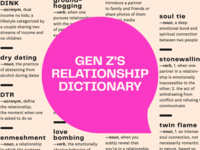Here is How to Future-Proof Your Dating Prospects According to an Expert

Dating should be fun and can be a way to learn more about yourself. However, the fun can easily turn into frustration when you're dating with the hope of long-term love and keep kissing frogs. That's why many are choosing future-proof dating. This is a way to ensure you're choosing prospects that align with your long-term relationship goals. In action, this relationship trend may cause people to ask the important questions first, like discussing someone's money values versus their favorite color.
Is future-proofing a dating trend worth jumping on? If so, how can you incorporate it into your dating life? We spoke to Tana C. Gilmore, a certified relationship, sex and intimacy coach, to learn more about this dating term and how to apply it on your journey to find love.
In this article:
What is Future-Proofing?
Future-proofing is a dating trend that focuses on intentional dating. It's about ensuring you're on the same page as a potential partner sooner rather than later. If you hope to have a healthy, purposeful and emotionally strong relationship, the goal is to gauge whether your prospects have the qualities needed for that type of union.
Dating can be tedious. After all, it's not always easy to find someone with whom you share values, enjoy being around and are attracted to. Sussing out compatibility early on can help you waste less time with people who don't have what you're looking for.
Future-Proofing Your Relationship
Future-proofing is a way to gauge whether you and a prospect have similar values. It can save you time and emotional turmoil to learn that you're not aligned within the first few dates rather than after a few months or even years. Some people may be worried that asking serious questions could scare off their date. While that is possible, the right person for you won't take off running because you're trying to have a meaningful conversation.
"Having honest convos about values, goals, and how you both deal with stress or change isn't just practical, it's kind of hot," Gilmore says. "It shows you're not just in this for the highlight reel—you're in for the bloopers, plot twists and all. So yes, talk about the future, even while you're still figuring out where to order dinner."
When you think about how a date should go, you probably don't imagine asking someone what their short-term goals are or how they work through conflict. However, these can be strong questions to future-proof your relationship and ensure the person you're sitting across from wants similar things. Here are some practical tips on how to future-proof the person before you get to the relationship stage.
Understand Your Wants and Needs
Before you can future-proof a relationship, it's important to be clear about what you're looking for. What are your values as an individual? What do you hope a partner will bring into your life? What are your non-negotiables? What vision do you have for a future partnership? Having that clarity can make you more decisive about whether a prospect is worth getting to know. It can also help you clearly communicate what you are looking for.
Avoid Intense Topics on the First Date
Although you want to figure out compatibility early on, you don't want to dive too deep too soon. Asking intense questions from the onset can create unnecessary pressure and zap the fun out of the date.
"Sneak in future chats without the pressure," Gilmore says. Say something like, "If we were stuck on a desert island together, who's doing the cooking and who's building the shelter?" It opens the door to learning how you each think, plan, and prioritize without sounding like a proposal in disguise."
It can also make your prospect feel like they're at an interview versus on a date. For this reason, avoid asking questions like whether they're ready for marriage or have an exact timeline for children on the first date. Instead, gradually work your way up to those questions. The goal should be to casually talk about the future while also focusing on the present.
Ask Questions That Gauge Compatibility
Questions are one of the easiest ways to get to know someone and understand their state of mind. Asking specific questions early in a relationship can help you extract information you're looking for about what your prospect values, desires for their future, and wants from a future partner.
In addition to asking general open-ended questions, you can also spice it up by throwing scenario-based questions into the conversation. Examples of questions to ask early in a relationship include what three items they'd bring if they were stranded on an island or how they would spend ten million dollars if they won the lottery. Conversation starter cards can be a lifesaver if you don't think you're good at asking questions.
Consider Unconventional Dates
Many times, you can learn more about who someone is by what they do versus what they say. Instead of grabbing coffee or food on the first few dates, consider doing an activity together. For instance, if you go for a jog, you can learn about a person's tenacity and even values around fitness. Likewise, going on a date to an escape room can help you learn about a prospect's problem-solving skills, patience and communication.
Pay Attention to Red Flags
Look out for how your date responds to your future-proofing attempts. Are they dismissive? Reluctant to engage in serious conversations? Or engaged and welcoming? How they respond can provide insight into whether they may be a good long-term fit. Communication is the pillar of every relationship, so anyone unwilling to communicate early on may not be a good candidate for a long-term partner. That said, some people take time to open up, so look at their body language and responses as a whole before making a judgment. Sometimes, a second or third date is needed to make a more informed decision.
Don't Try to Control the Outcome
Future-proofing shouldn't be a way of trying to control the outcome. You may ask all the right questions, but sometimes that doesn't guarantee you'll get the outcome you desire or expect. It's also important to be flexible, remembering nobody is perfect without compromising non-negotiables.
"At the end of the day, we can do all of the future-proofing we want, but what we do know is there are ebbs and flows to any relationship, and there are no guarantees," Gilmore says. "The only guarantee is that you both will work hard and invest in the relationship together."























